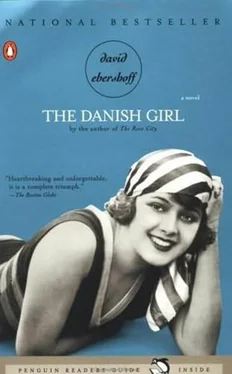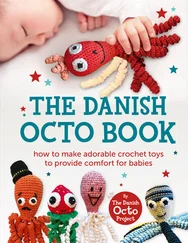“We weren’t,” Greta said, kneeling. And then, “No, you’re right. How do you feel, Lili? Tell me. How do you feel today?”
“I feel fine except for the pain, but that’s getting better. Frau Krebs and Nurse Hannah both say it’ll ease up and then I can go home.” Lili now sat forward in her wicker wheelchair. She steadied her hands and tried to pull herself up.
“Don’t stand,” Greta said. “Not unless you’re ready.”
Lili tried again, but her arms couldn’t manage. She’d become so hollow, a nearly weightless girl emptied out by both illness and her surgeon’s knife. “I’ll be ready soon,” Lili finally said. “Maybe next week. We’re moving back to Copenhagen, Professor Bolk. Has Greta told you we’re returning to Copenhagen?”
“That’s what I understand.”
“And we’re moving into our old apartment in the Widow House. You’ll have to come visit us. Do you know Copenhagen? We have a marvelous view of the Royal Theatre’s dome, and if you open the window you can smell the harbor.”
“But, Lili,” Greta said, “you won’t be ready to leave next week.”
“If I keep on improving like this, then why not? Tomorrow I’ll take my first steps again. Tomorrow let’s try to walk a little in the park.”
“Don’t you remember, Lili?” the professor said, holding his papers against his chest. “There’s another operation.”
“Another operation?”
“Just one more,” Greta said.
“Whatever for? Haven’t you done everything already?” Lili couldn’t say the words, but she was thinking: But haven’t you already restored my ovaries and removed my gonads? No, she could never say it. How humiliating it was, even with Greta.
“Just one last procedure,” Professor Bolk said. “To remove your-”
And Lili-who was no older and no younger than her present mood, who was the ghost of a girl, both ageless and unaging, with adolescent naïveté erasing the decades of another man’s experience, who each morning cupped her swelling breasts like an overanxious girl praying for her first menstruation-closed her eyes against the shame. Professor Bolk was informing her that down there, beneath the gauze and the brown iodine dressing that looked like the watered-down gravy Einar had endured during the war, just up from her fresh, still-healing wound, lay one last roll of skin that belonged to Einar.
“All I need to do is remove it and refold the-” Lili couldn’t bear the details, and so instead she looked to Greta, whose lap was filled with an open notebook. Greta was sketching Lili at this moment, looking from her to the notebook and back, and when Greta’s eyes met Lili’s, Greta set down her pencil and said, “She’s right. Can’t you hurry up the next operation, Professor Bolk? What’s the wait?”
“I don’t think she’s ready. She isn’t strong enough yet.”
“I think she is,” Greta said.
They continued to argue, while Lili shut her eyes and imagined Einar as a boy on the lichen rock watching Hans return a shot with his tennis racquet. She thought of Henrik’s moist hand in hers at the Artists Ball. And the heat of Carlisle’s eyes on her early that damp morning at the market. And Greta, her eyes narrowing into concentration, as Lili posed on the lacquer trunk. “Do it now,” she said softly.
Professor Bolk and Greta stopped. “What did you say?” he asked.
“Did you say something?” Greta said.
“Please just do it now.”
Outside in the back-park the new girls, whom Lili didn’t recognize, were gathering their books and their blankets and were reentering the clinic for the evening. The willows were sweeping the lawn of the Municipal Women’s Clinic, and beyond the girls a rabbit dashed into a gooseberry shrub. The current of the Elbe held the flat-bottomed freighters, and, across the river, the sun hit the copper roofs of Dresden and the great, almost silver dome of the Frauenkirche.
She shut her eyes and dreamed, somewhere in her future, of crossing the square of Kongens Nytorv, in the shadow of the statue of King Christian V, and the only person in the world who would stop and stare would be the handsome stranger whose heartswell would force him to touch Lili’s hand and profess his love.
When Lili opened her eyes, she saw that Greta and the professor were looking down toward the end of the Wintergarten . A tall man was standing in the door frame. He moved toward them, a silhouette, his coat over his arm. Lili watched Greta watch the man. Greta pushed her hair back over her ears. Her finger brushed at the scar on her cheek. Her hands rubbed together, the bracelets tinkling, and she said, her voice a soft gasp, “Look.” And then, “It’s Hans.”
Part Four. Copenhagen, 1931

They returned to the Widow House, but over the years the building had declined. While in Paris, Greta had hired a man named Poulsen to manage the upkeep. Once a month she mailed a check, enclosed with a note of instruction. “I suppose the gutters need clearing by now,” she’d write. Or, “Please rehinge the shutters.” But Poulsen followed none of the orders, tending to little beyond sweeping the foyer and burning the trash. When Greta and Hans motored into Copenhagen on a morning when the snow was flinging itself against the city’s sills, Poulsen disappeared.
The facade had faded to a pale pink. On the upper floors, gull droppings caked the window frames. A pane of glass was missing in an apartment where a fidgety woman in her nineties had died in the night, strangled by the twist of her bedsheet. And a fine black grime streaked the walls of the stairwell that led to the top floor.
It took Greta a few weeks to ready the apartment for Lili. Hans helped, hiring the crew to paint and the waxer to polish the floors. “Has she ever thought about living on her own?” he asked one day, and Greta, startled, replied, “What? Without me?”
Slowly she eased Lili into the sea of life in Copenhagen. On slushy afternoons, Greta held Lili’s hand and strolled her through the boxhedges, leafless in late winter, of Kongens Have. Lili would shuffle her feet and sink her mouth into the wooly wrap of her muffler; the surgeries had left her with a steady pain that flared up as her morphine wore off. Greta would say, feeling the tap of pulse in Lili’s wrist, “Take your time. Just let me know when you’re ready.” She supposed the day would come when Lili would want to set out into the world by herself. She saw it in Lili’s face, in the way she would study the young women, packages of butter rolls from the bakery in their hands, walking busily across Kongens Nytorv each morning, women young enough for hope to still flicker in their eyes. Greta heard it in Lili’s voice when she would read aloud from the wedding announcements in the newspaper. How Greta dreaded the day; she sometimes wondered whether she would have gone along with everything if she had realized, at the outset, that it would end with Lili departing the Widow House, a slim suitcase in her hand. There were days during their first few months back in Copenhagen when Greta sometimes believed that she and Lili could create a life for themselves on the top floor of the Widow House and neither of them would leave for any longer than an afternoon. Sometimes, when she and Lili were sitting next to the iron stove, she came to think that the past years of upheaval and evolution had come to a close, and now she and Lili could paint and live peacefully, alone but together. And wasn’t that the inexhaustible struggle for Greta? Her perpetual need to be alone but always loved, and in love. “Do you ever think I’ll fall in love?” Lili had begun to ask, as spring returned and the gray seeped out of the harbor, replaced by the blue. “Do you think something like that could happen even to me?”
Читать дальше













